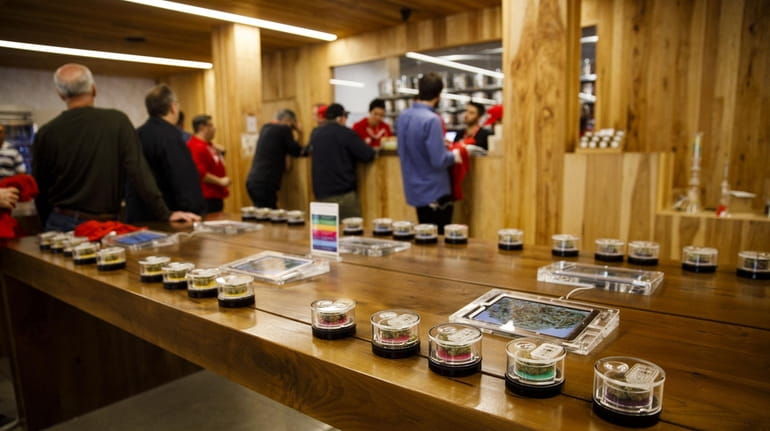False promises about legalized weed

Different strands of marijuana are displayed on a table at the MedMen dispensary in West Hollywood, California on Jan. 2, 2018. Credit: Bloomberg/Patrick T. Fallon
The rush to legalize and commercialize marijuana has many elected officials making claims that the facts don’t back up. This unrealistic view of legal weed is the result of an orchestrated information campaign by activists and lobbyists tied to a growing industry that parallels Big Tobacco. In fact, Altria, the owner of Marlboro, has invested more than $1 billion in Big Pot.
If we did our homework on what happens when you legalize today’s pot, which is many times more potent than the weed of Woodstock, we would find out that the results don’t match anything like the rosy promises made by Gov. Andrew M. Cuomo and industry leaders.
We’ve been told that we should commercialize weed because it will lower incarceration rates, reduce crime, produce millions of dollars (or even billions) in tax revenue and improve economic opportunity, especially for minority and lower-income populations. We’ve been told pot is not a gateway drug, and that negative impacts on physical or mental health are outweighed by the positives.
All of those assertions fly in the face of science and the experiences of other states that turned weed into a big business.
Looking to states that legalized pot, we see the social justice argument doesn’t hold water. African-Americans are twice as likely to be arrested for marijuana in Colorado and Washington. In Denver, weed stores are clustered in minority neighborhoods in much the same way that liquor stores zone- in on low-income areas.
We’ve heard that Big Pot will be a big win for taxpayers. In New York City, former Council Speaker Melissa Mark-Viverito wanted to use an estimated $1.3 billion annually from weed to fix the subway. In Albany, Cuomo offered a more conservative estimate of $300 million, estimated without any backup. That’s only one fifth of 1 percent of the state budget.
California’s pot-related tax revenue missed projections by more than 50 percent, and the former governor of Colorado has said tax revenue from pot won’t solve fiscal challenges faced by states and municipalities.
In fact, commercialization backers rarely discuss the costs associated with widespread use of the drug on health care, mental health services, law enforcement, businesses and consumers. A study in Colorado found that for every $1 received in tax revenue from marijuana sales, $4.50 must be spent to mitigate the social costs, including due to workplace, health and criminal justice reasons.
Cuomo’s proposal provides no resources for local governments, law enforcement and public health services. Keep in mind, many major U.S. medical associations oppose the commercialization of pot.
New Yorkers looking for economic opportunity also have been falsely promised that pot will provide new jobs and give rise to new entrepreneurs. Big Marijuana, like Big Tobacco, will squeeze out small business and those who lack resources. In fact, Altria has purchased Juul, a vape-technology company. In New York, MedMen, a California-based company, operates four locations, while other multistate players that operate in the medicinal market like Curaleaf and Vireo Health, are pitching themselves as avenues to quickly bring weed to consumers.
In February 2017, Cuomo said, “It’s a gateway drug, and marijuana leads to other drugs, and there’s a lot of proof that that’s true.” Today, he would ignore the experiences of other states, medical science, law enforcement, and substance-abuse professionals to ram commercialized weed through the legislature.
This isn’t an-all-or-nothing proposition. New York has time to examine the facts and consider decriminalization rather than create another industry that is fraught with costs and consequences. Because perhaps the biggest false promise of all, is that this time, it will be different.
Kevin Sabet, a former adviser to three U.S. presidential administrations, is president and CEO of Smart Approaches to Marijuana, a nonprofit.
